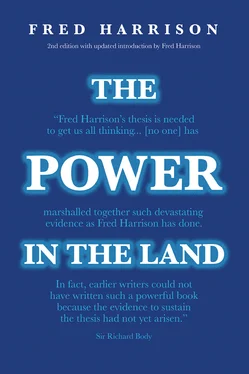THE POWER IN THE LAND
It does not matter where you look or what examples you select, you will see that every form of enterprise, every step in material progress, is only undertaken after the land monopolist has skimmed the cream off for himself, and everywhere today the man of the public body who wishes to put land to its highest use is forced to pay a preliminary fine in land values to the man who is putting it to an inferior use, and in some cases to no use at all. All comes back to the land value, and its owner for the time being is able to levy his toll upon all other forms of wealth and upon every form of industry. A portion, in some cases the whole, of every benefit which is laboriously acquired by the community is represented in the land value, and finds its way automatically into the landlord’s pocket. If there is a rise in wages, rents are able to move forward, because the workers can afford to pay a little more. If the opening of a new railway or a new tramway or the institution of an improved service of workmen’s trains or a lowering of fares or a new invention of any other public convenience affords a benefit to the workers in any particular district, it becomes easier for them to live, and therefore the landlord and the ground landlord, one on top of the other, are able to charge them more for the privilege of living there.
WINSTON S. CHURCHILL, in a speech in Edinburgh, July 17, 1909
THE POWER IN THE LAND
An Inquiry into Unemployment, the Profits Crisis and Land Speculation
Fred Harrison

Published in the United States of America in 1983
by Universe Books
381 Park Avenue South, New York, N.Y. 10016
© Fred Harrison, 1983
First published in the United Kingdom by
Shepheard-Walwyn (Publishers) Ltd, London, 1983
All rights reserved. No part of this publication
may be reproduced, stored in a retrieval system,
or transmitted, in any form or by any means,
electronic, mechanical, photocopying, recording, or
otherwise, without prior permission of the publishers.
ISBN 0 87663-424-2
83 84 85 86 87 / 10 9 8 7 6 5 4 3 2 1
Printed in the United Kingdom
Acknowledgements
This book would have been written by Vic Blundell, but for his lifelong dedication to the instruction of mature students who have sought solutions to social problems through an understanding of the science of political economy. The duty to write the book, then, fell to one of his pupils, and it is with pleasure that I express my deep gratitude to him for the generous help that he gave me in the development of some of the key ideas contained in this work.
Some of the research was undertaken while globe-trotting on assignments for my newspaper, The Sunday People. A succession of Editors have flown me to locations that made it possible to witness at first hand the workings of the land market in places as diverse as Hong Kong and Sydney, Athens and Kingston (Jamaica). When the Sunday deadlines were met, I was able to switch to on-the-spot investigations that extended my appreciation that the world is one single economy, and that we must work together to find solutions that will serve the common interest. I thank my Editors, whose unwitting role in the production of this book absolves them from any responsibility for the views expressed herein.
Many people helped me during my travels, and I would particularly like to acknowledge the assistance received from Walter Rybeck in Washington, Allan Hutchinson in Melbourne and the late Professor Philip Finkelstein in New York.
Writing is the most civilising of man’s arts, but for its dedicated practitioners it is also the most anti-social. And so I record with humility my greatest debt, which is to my wife Rita and daughter Nina, who bore my absence from family routines with fortitude.
Contents
Acknowledgements Acknowledgements This book would have been written by Vic Blundell, but for his lifelong dedication to the instruction of mature students who have sought solutions to social problems through an understanding of the science of political economy. The duty to write the book, then, fell to one of his pupils, and it is with pleasure that I express my deep gratitude to him for the generous help that he gave me in the development of some of the key ideas contained in this work. Some of the research was undertaken while globe-trotting on assignments for my newspaper, The Sunday People. A succession of Editors have flown me to locations that made it possible to witness at first hand the workings of the land market in places as diverse as Hong Kong and Sydney, Athens and Kingston (Jamaica). When the Sunday deadlines were met, I was able to switch to on-the-spot investigations that extended my appreciation that the world is one single economy, and that we must work together to find solutions that will serve the common interest. I thank my Editors, whose unwitting role in the production of this book absolves them from any responsibility for the views expressed herein. Many people helped me during my travels, and I would particularly like to acknowledge the assistance received from Walter Rybeck in Washington, Allan Hutchinson in Melbourne and the late Professor Philip Finkelstein in New York. Writing is the most civilising of man’s arts, but for its dedicated practitioners it is also the most anti-social. And so I record with humility my greatest debt, which is to my wife Rita and daughter Nina, who bore my absence from family routines with fortitude.
THE UNFREE MARKET THE UNFREE MARKET
1: The Fatal Mistake
2: Laissez Faire: Adam Smith’s Version
3: Monopoly and the Veil of Secrecy
4: The Power Loom Puzzle
A THEORY OF RECESSIONS
5: Speculation: a US Hypothesis
6: 18-year Cycles: the UK Evidence
7: Under Siege: the Englishman’s Castle
THE UNITED STATES ECONOMY
8: The Hoyt Heist
9: Recycling the Speculators
10: Policies of Pillage
THE JAPANESE ‘MIRACLE’
11: Spirit of the Samurai
12: The Conquest and Collapse
THE SOCIALIST MODELS
13: Marxist Theory and Soviet Experiment
14: Nationalisation & the Mixed Economy
LAND VALUE TAXATION
15: The Single Tax and Laissez Faire
16: Academie Strictures: a Critique
17: Equity and Creative Financing
18: Australia: a Case Study
THE POVERTY OF POLITICS
19: 1974-1978: Operation Lifeboat
20: 1979: the Reagan-Thatcher Myth
21: 1980s : Policies for Recovery
CAPITALISM
22: Requiem or Revival?
BIBLIOGRAPHY AND INDEX
Select Bibliography
Index
THE UNFREE MARKET
1 The Fatal Mistake
When Mae West told reporters ‘I never say “No!” to a good offer’, she was not adding yet another one of those sexually suggestive throwaway phrases to the list that made the Hollywood actress famous. She was referring to the land deals that enabled her to build a fortune estimated at around $45m. Her wheeling-dealing gave the late Miss West a mysterious influence which was immeasurably more powerful than her ability to attract men with her celluloid sex. For deals such as those she shrewdly executed in California’s San Fernando Valley are at the source of the problem that periodically afflicts the global economy.
The honey-tongued actress commanded the power to disrupt the productive process because industrial society, quite simply, was built on a mistake. The free market, which Adam Smith called ‘the invisible hand’, was supposed to be the guiding mechanism which equalised the multiplicity of interests and decisions in the economy; it was supposed to aggregate these in such a way that the potential conflicts between private goals would be removed within a harmonious social framework. The mistake made by the founding fathers of the Industrial Revolution in the 1780s — the inventors of new-fangled machines and the entrepreneurs who capitalised on the new factory-based processes of mass production — was to accept and institutionalise land monopoly. The British people, from the Clyde in Scotland to the Thames in the south-eastern corner of England, brought together human skills and material resources in a unique combination, and built a new economic edifice on a corrupt foundation. The good life for all was technically capable of achievement, but was not allowed to be fully realised.
Читать дальше













